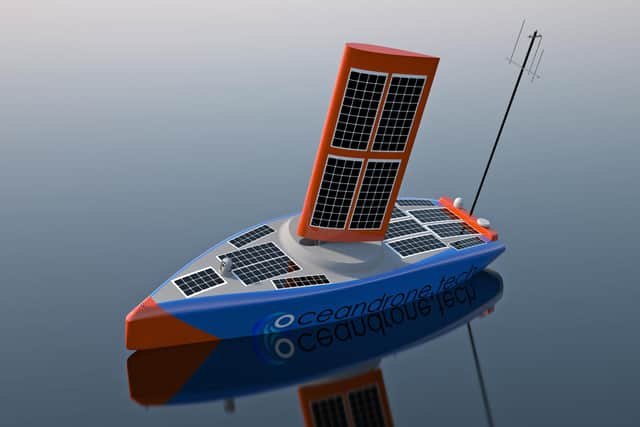Engineering firm nets funding to support development of 'eco-robotic' surface vessel
The Aberdeen-based firm has received the funding boost from the Energy Technology Partnership (ETP) in conjunction with Strathclyde University in Glasgow. It will support a research and development (R&D) project for Innovo’s autonomous wind, solar and hydrogen fuel cell powered surface vessel, called Oceandrone.
Designed by the company’s team of engineers and naval architects, Oceandrone uses a combination of wind, solar and hydrogen power and incorporates patented sail management and unique propulsion systems. It aims to reduce CO2 emissions from operations in offshore industries including energy, renewables, ocean sciences, marine environmental protection and military.
Advertisement
Hide AdAdvertisement
Hide AdOther potential markets for Oceandrone include telecoms, subsea data storage, ocean research, fish farming, seabed mineral exploration, carbon capture, hydrogen generation and ocean sciences.


Business development director Garry Millard said: “Innovo is committed to developing an autonomous, eco-robotic wind, solar-cell and hydrogen fuel-cell sailing craft that will revolutionise unmanned autonomous surface vehicles.
“Innovo's innovation will help the Scottish government reach its goal of net zero carbon by 2045 by replacing marine survey support vessels working within the renewable energy sector and supporting a reduction in travel, thereby reducing CO2 emissions.”
He added: “This R&D project with Strathclyde University moves us closer to our objectives of creating 15 Scottish jobs, generating £10 million in annual revenue, spending an additional £3m on R&D and achieving an export value of £20m by 2025.”
Strathclyde University’s Power Networks Demonstration Centre (PNDC) is hosting the ETP-funded R&D project for Oceandrone’s development.
Brian Cross, project manager at ETP, said: “At our very first meeting with Innovo we knew we were dealing with a highly innovative Scottish SME [small and medium-sized enterprise] that needed some additional technical expertise to take their product forward.
“We were able to connect them to Dr Mazheruddin Sayed at the Institute for Energy & Environment, University of Strathclyde, and the project has been a complete success, proving once again, that knowledge exchange between Scotland’s SMEs and our university researchers can be a game-changer in low carbon energy product development,” he added.
A message from the Editor:
Thank you for reading this article. We’re more reliant on your support than ever as the shift in consumer habits brought about by coronavirus impacts our advertisers. If you haven’t already, please consider supporting our trusted, fact-checked journalism by taking out a digital subscription: www.scotsman.com/subscriptions
Comments
Want to join the conversation? Please or to comment on this article.
